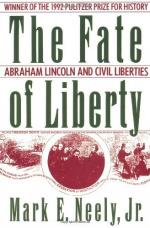|
This section contains 945 words (approx. 3 pages at 400 words per page) |

|
Chapter 2 Summary and Analysis
Chapter 2, "Actions without Precedent," shows how in Missouri, a loyal state, Lincoln allows civilians to be tried by military commissions, suspending the writ of habeas corpus after local commanders have suspended civil liberties. Troubles begin on Mar. 10, 1861, when militiamen thought ready to seize the St. Louis arsenal are arrested, Judge Samuel Treat orders Captain Emmett McDonald released, and General William S. Harney refuses, on grounds of "higher law." Operating in a policy vacuum, General John C. Frymont closes the St. Louis State Journal and declares martial law. Brigadier General Ulysses S. Grant, allows mere captains to take hostages, seize property, confiscate a newspaper, interfere with mail, and break up river trade, but doubts the legality of his actions and seeks guidance. Fearing Frymont's emancipation policy will cost the Union Kentucky and the summary execution of prisoners will spark retribution, Lincoln controls...
(read more from the Chapter 2 Summary)
|
This section contains 945 words (approx. 3 pages at 400 words per page) |

|




